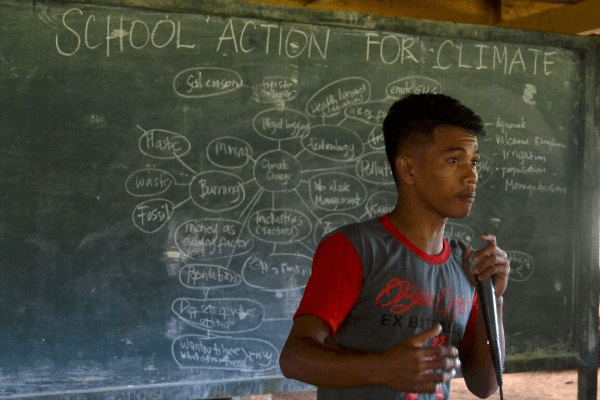
The chemical agricultural business has arrived in full force, promising the world; conditions are but a whisper. The promise of a fortune wins many followers and for most it turns to debt with the traders, while the soils are leached of nutrients and erode. Upland small farmers are today the poorest professionals on earth. The world is into pre-packaged, reconstituted, preserved easy foods at hunger farmgate pricing.
But life’s not all like that; many care and are changing how things move. Many answers we reap today cause us to ask new questions, to hope and act for a better future. Every generation must face new questions and it is good that there are others who accompany.
Some of the farmers give priority to their own food security. They seek to secure community water quality by protecting spring sources and regenerating natural forest. Previously they supported their children to get jobs outside in poultry farms and gas stations, but now some have come home sick. A few youth, who having experienced these changes, have other ideas and are asking where they belong. What can they relearn from their own people, not just from popular media? Three of the youth team I travelled with told their own stories and questioned why the old relations of community are not taught. A second chance to weigh things up is becoming increasingly important for the youth after initial work experience; creating space for such exchange is critical.
As a Jesuit, I support the Apu Palamguwan Cultural Education Center which runs training programmes for youth including bamboo processing, organic food and rebuilding ecological services in the face of climate change. It is important for youth to ask questions, communicate, (i.e. trust others) and to weigh up commitment before deciding on action.
I also work on the research end of Environmental Science for Social Change and Ecojesuit and advocate for “glocal,” the local-to-global. As we work locally, stories go out and coalesce from many areas at the global level, strengthening the advocacy or the agenda for change. Precisely because of rapid change, local realities get to the centre where others are building platforms and networks, a wirearchy supporting local voices.
Collaboration today goes way beyond Jesuit networks with people who share in the mission of a healing world bearing good news. The Universal Apostolic Preferences give us the basis to share meaningfully and discern in a secular world where interfaith action is recognised and valued. Ecojesuit this year continues to give focus to efforts in climate strike/action and meetings of the annual Conference of the Parties(COP of the UN Framework Convention on Climate Change) to form guidelines for the Paris Agreement and the SDGs ,as engaged by communities of hope.
Pope Francis’ post-Amazon Synod message, Querida Amazonia, must have a thousand quotes bringing joy to the world.
“In order to prevent this process of human impoverishment, there is a need to care lovingly for our roots, since they are ‘a fixed point from which we can grow and meet new challenges.’ I urge the young people of the Amazon region, especially the indigenous peoples, to ‘take charge of your roots, because from the roots comes the strength that will make you grow, flourish and bear fruit.”
Every community we visited in the Pulangi Valley cooked what food they had to welcome us. I continue to learn from the rich-at-heart with great hope, great mercy and peace. Human nature has a good side which, though not always prevailing, is unquenchable. Commitment to change is not simply a question of success but of accompaniment, endurance, and of shared hope.
Author: Pedro Walpole SJ, is the Director of Research at the Institute of Environmental Science for Social Change in the Philippines and the Coordinator of Reconciliation with Creation for the Jesuit Conference Asia Pacific.

